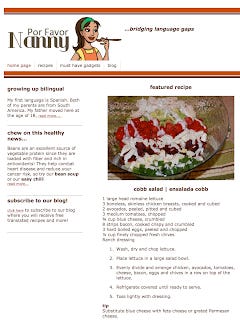And Yet Another Chapter in the History of Maids in America: Por Favor Nanny Edition | New Posting by Austin, Texas Correspondent, Jaime Puente

I met some pretty remarkable graduate students, undergraduates, and professor on my recent tour of San Antonio College, UTSA, and UT Austin--one of those, a graduate student at the UT Center for Mexican American Studies is a new correspondent for the Textmex Galleryblog; here's his first dispatch on POR FAVOR NANNY!
-------------------------------------------------------------------------
Date: Tue, 27 Sep 2011 10:46:23 -0500
From: Jaime Puente <jrpuente@utexas.edu>
To: memo@sdsu.edu
Subject: Por Favor Nanny: Because Your Nanny Should Never Speak Back
Hey Memo,
I met you last friday at your UT lecture and mentioned this story: Por Favor, Nanny: Houston Moms Teach You How to Tell Your Nanny to Wash Her Hands
Here are some thoughts I have about this....
I see things like this and my head begins to shake with believing disbelief. With a black president, a Latina on the Supreme Court, and other evidence "proving" the United States is living in a "post-racial" era, I don't want to believe people could be so unaware of the context of their actions that they would produce something called: Por Favor Nanny: Please Make Dinner. Yet, I live in Texas and the United States where we breed ignorance better than steers. How can I NOT believe it?
Of course there are some who say: "This isn't racist, it's a helpful guide for employers to communicate with their employees." But, this book and the accompanying website are not trying to foster better communication. I have not been able to read the book yet, but the title almost says it all. The Houston Press article also shows some of the phrases and statements they want to teach people who hire nannies (apparently all nannies speak Spanish):
Among the phrases translated:
-- Please bring me back the receipt. ( Por favor, traeme el recibo.)
-- How much did you spend? (¿Cuanto gasto?)
-- Please wash hands before preparing food. (Por favor, lavate las manos antes de preparar la comida.)
-- Please wash hands after... using the restroom, coughing or sneezing. (Por favor, lavate las manos después de... usar el baño, toser o estornudar.)
There is no mention anywhere on the website that there may be nannies out there who don't speak Spanish. The assumption here is that people who hire nannies only hire nannies that speak Spanish. That says something about the way the authors envision those working in the so called honorable profession. It doesn't take a genius to know that Chicanas and Latinas have been given this identity by a racialized power structure, and this book just makes that even more clear.
By producing a book that tells affluent non-Spanish speaking people how to command your Spanish speaking nanny to wash her hands after using the restroom the authors are reproducing the environment that give people (their children) the idea that women who speak Spanish (Latinas & Chicanas) are there to serve them - not communicate with them. If the authors wanted to foster better communication between employee and employer, they would have produced a book that speaks to the importance of the employer learning Spanish. They would have stressed the importance of being able to understand what the nanny says in response to all the commands to cook dinner, clean house, and take care of bratty children.
But, that's not the project here. The project is to make sure your Spanish speaking nanny can understand your commands while not being able to respond to you. I mean who wants an uppity Spanish-speaking nanny talking back anyway?
Jaime Rafael Puente
Graduate Student
Center for Mexican American Studies
University of Texas at Austin
jrpuente AT utexas DOT edu
tex[t]-mex galleryblog | ©2006-2011 | w. a. nericcio
